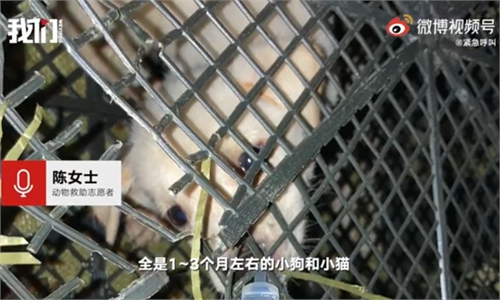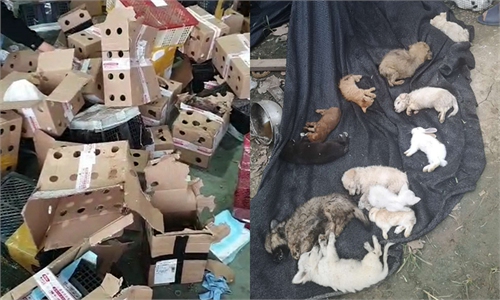Over 100 pets in ‘blind boxes’ rescued in Shanghai; case not related to ZTO: carrier

Over 100 animals received care at an animal helping center in Chengdu, capital of Southwest China's Sichuan Province on May 7 after they were found being sold via the "blind boxes." Photo: VCG
More than 100 dogs and cats put in so-called blind boxes were rescued in Shanghai on Monday, sparking a new round of criticism and heated discussion among Chinese netizens, just months after similar cases were reported in the country.
The animals were found in front of a residential community in Jiading district on Monday afternoon. The place had a foul smell as some of the animals had already died by the time they were found, according to local media reports.
A video widely shared online showed veterinarians and volunteers helping check the animals to ensure their safety. Police were also present to keep order and help those who wanted to adopt some of the remaining animals. A few of the animals were puppies and kittens, and their rescue was crucial since they couldn't survive longer as it was raining at the site.
As of 1:30 am on Tuesday, a total of 71 cats and 36 dogs had been adopted by volunteers, according to media reports.
A voice from the video said that the deliverymen had torn up the express waybill. ZTO Express, the company reportedly used to transport the pets, replied that it had taken note of the incident and was investigating it. However, it confirmed to Beijing Business Today later on Tuesday that the activities involved in the video were not related to ZTO, and the company had reported the matter to the local police and provided information such as cargo owners and carriers.
A police officer from Nanxiang police station in Jiading confirmed to the Global Times on Tuesday that police officers went to the site after receiving a call.
Based on postal regulations, live animals may not be shipped via postal channels. Before engaging in the business of transporting animals and animal products by rail, road, water, or air, the consignors must provide quarantine certificates. Carriers may not accept the shipments if the consignors don't have quarantine certificates, according to the revised Animal Epidemic Prevention Law that took effect on May 1.
The hashtag "more than 100 pets in 'blind boxes' were abandoned" on Chinese Twitter-like Sina Weibo had 52 million reads as of press time. Many netizens have called for establishing new laws to protect pets.
"For human beings, this would be a case of abuse. But for the little creatures, it's a disaster, just like a tsunami, an earthquake, a serious epidemic in the human world," one netizen wrote on Sina Weibo.
It's not the first time such a case has been reported in China, despite the country's efforts to crack down on illegal activities such as mailing live animals and online trading.
In May this year, dozens of dogs and cats put in "blind boxes" were rescued in Chengdu, capital of Southwest China's Sichuan Province, triggering criticism of the illegal business. A few days later, the ZTO Express Wuxi branch in East China's Jiangsu Province was fined 30,000 yuan ($4,647) for illegally delivering live pets including dogs and cats, causing many of them to die.
Global Times




